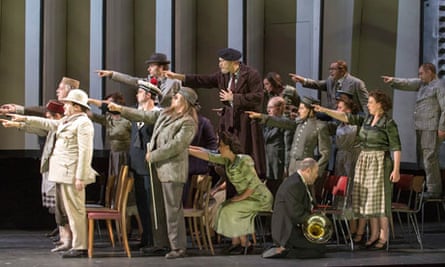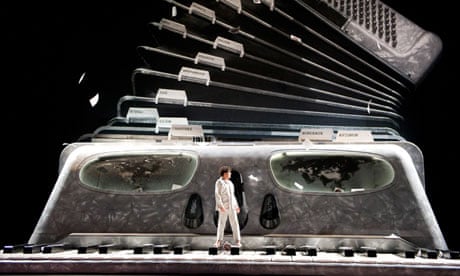What is generally regarded as Martinů's finest opera had to wait 40 years for its British premiere, until the New Opera Company staged it at the Coliseum in 1978. There was another production at Opera North in 1997, and now Julietta has returned to the Coliseum; Richard Jones's staging for English National Opera was first seen in Paris 10 years ago, but has come up as crisp as if it were newly minted.
The world that Martinů explores in Julietta, in which the boundaries between reality, fantasy and dream are blurred, suits Jones's theatrical imagination perfectly. Based upon a play by the French surrealist Georges Neveux, it's the story of Michel, a Parisian bookseller, who arrives in a provincial French town to search for a beautiful woman he heard singing at a window there three years earlier. He finds himself surrounded by townspeople who have lost most of their memories, for whom any recollection of childhood is fiercely coveted, and where anyone with such memories is regarded with deep suspicion. After a series of surreal encounters, Michel, inevitably, loses his memory, too, though whether any of what happens is real, or whether it and the woman he finds and loses again are just products of his own fantasies, remains teasingly unresolved.
Martinů pins this beguiling fable, with its echoes of both Debussy's Pelléas and Janáček's Makropulos Case, to a typically eclectic score, with vocal lines that range from speech to fully winged arioso, and orchestral writing that cheerfully plunders three decades of 20th-century music history – Debussy and Ravel, Alban Berg, Prokofiev and Stravinsky. Yet, as the music ricochets from one style to the next in a freely associating way, it matches the loose dramatic structure of the opera perfectly, conjuring up a world in which nothing is certain and everything is provisional.

Edward Gardner controls the music's ducking and diving with great finesse, and Jones's production – played out on wonderfully imaginative sets by Antony McDonald, based on the keyboard, buttons and bellows of a piano accordion (its sound is a feature of crucial moments in the score) – marshals the action with absolute clarity. Above all, it feels like a real company show, of the kind that was taken for granted 20 years ago, but is an increasing rarity now.
Peter Hoare gives a wonderfully assured performance as Michel, a mixture of bafflement and determination, and Julia Sporsén is the flame-haired object of his desires; the rest of the cast have multiple roles, and having Andrew Shore, Susan Bickley, Jeffrey Lloyd-Roberts, Gwynne Howell and Henry Waddington taking many of them is luxury casting.
What have you been to see lately? Tell us about it on Twitter using #GdnReview

Comments (…)
Sign in or create your Guardian account to join the discussion